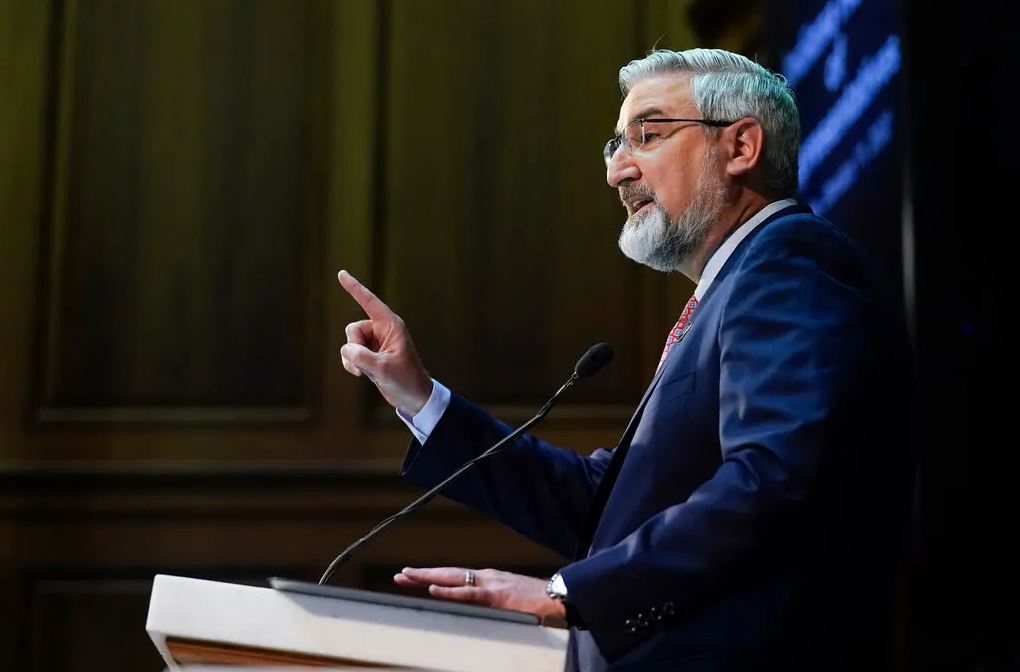A bill that would have prohibited transgender girls from participating in school-sponsored girls’ sports was vetoed by Indiana Gov. Eric Holcomb on Monday. Holcomb’s position on the issue differs significantly from that of 11 other Republican governors who have signed similar bills into law in recent years.
According to Mr. Holcomb, the law, known as H.E.A. 1041, would have most certainly been challenged in court if it had been passed. His concerns about whether it was addressing any pressing issues were expressed in a letter to legislators, in which he stated that “the presumption of the policy laid out in H.E.A. 1041 [Hoosier Education Act 1041] is that there is an existing problem in K-12 sports in Indiana that necessitates additional state government intervention.”
Transgender girls and women participating in sports has become an increasingly divisive topic among political leaders and sports sanctioning organisations, who have struggled to deal with the issue in a way that respects transgender athletes while also addressing concerns raised by some critics about competitive fairness. Lia Thomas, a member of the University of Pennsylvania’s women’s swimming team, made history last week by being the first openly transgender woman to win a National Collegiate Athletic Association swimming championship.
According to the Human Rights Campaign, an L.G.B.T. advocacy organisation, state legislators around the nation have sponsored hundreds of laws that would restrict transgender children from participating in school sports on teams that correspond to their gender identities since 2019.
Earlier this year, Texas became the state with the highest population to prohibit transgender females from participating in girls’ athletics at public schools. Similar legislation has been signed into law by Republican governors in Alabama, Arkansas, Florida, Idaho, Iowa, Mississippi, Montana, South Dakota, Tennessee, Texas, and West Virginia, among other states.
A number of conservatives in Indiana applauded the law, which was enacted by an overwhelming majority of the state’s Republican-controlled legislature. Todd Rokita, the state’s Republican attorney general, hailed the bill’s passing as “an significant step in defending child sports” after it was passed.
Democrats and transgender advocates have mostly decried the haste with which the Act was passed, calling it cruel and unnecessary. They commended Mr. Holcomb for his veto, while also expressing fear that Indiana lawmakers would overrule his decision in the future.
Despite her optimism, Ms. Oakley expressed concern that “transgender kids in Indiana are not out of the woods yet.” With a majority vote in both the House and the Senate, legislators may overrule Mr. Holcomb, who is serving his second term as governor and is not eligible to seek for re-election until 2024 under state term limits. Majorities in both houses of Congress voted in favour of the legislation.
It was proposed as a method to shield religious companies from having to cater same-sex weddings, but it was met with tremendous resistance, including from some of Indiana’s most well-known corporations and religious organisations. After a short time, it was completely changed to specifically prohibit discrimination on the basis of sexual orientation or gender identity.
Ms. Holcomb, who was designated lieutenant governor by Mr. Pence after the outcry against the religious freedom bill, stepped in as the Republican contender for governor in 2016 when Mr. Pence was nominated as Donald J. Trump’s running mate in the presidential election.
Ms. Holcomb has supported several conservative initiatives throughout her tenure as governor. One such policy is the legislation she signed on Monday that allows individuals in Indiana to carry firearms without a permit. However, he has sometimes adopted a more moderate posture than other Republicans, causing some conservatives consternation by imposing virus limitations during the early phases of the epidemic in 2003.
Many Republicans around the nation have welcomed legislation prohibiting transgender athletes’ participation in sports, but Mr. Holcomb is not alone in his opposition to such legislation within his own party.
North Dakota Gov. Doug Burgum (R) vetoed a bill that was quite similar to this one last spring. In addition, Utah Gov. Spencer Cox, a Republican, is poised to reject a law that would have prevented young transgender athletes from participating in females’ sports, according to media reports.
Mr. Cox said that he had been caught off guard on March 4 by state senators from his own party, who passed a last-minute version of the bill without consulting Democrats or transgender-rights supporters, who had been negotiating for weeks on a compromise.
In a press conference after the passage of the Act, Mr. Cox expressed his concern for the transgender community by declaring, “We care about you.” We are madly in love with you. Everything is going to be OK. I believe that we will be able to go through this together.”

